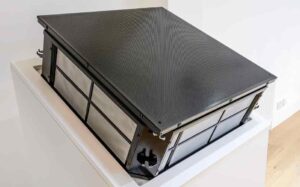DCLG could scrap Display Energy Certificates
15th February 2015 UK: The government has proposed significant changes to the Display Energy Certificates scheme which could see the requirement being scrapped for some public sector buildings.
UK: The government has proposed significant changes to the Display Energy Certificates scheme which could see the requirement being scrapped for some public sector buildings.
The Department of Communities and Local Government (DCLG) has issued a consultation document which reviews the role and methodology for Display Energy Certificates (DECs). It specifically looks at areas where the UK has exceeded its requirements under the EU regulation, so-called “gold plating”.
Part of the Energy Performance of Buildings Regulations, the Display Energy Certificates provide both users and the general public with a visual representation of the operational efficiency of the building. The DEC gives a comparison over three years so as building managers cans see how any improvements made have impacted year on year. Since 2008, all public buildings over 1,000m² have been required to have a DEC which shows the energy performance of the building based on its actual annual energy consumption and the CO₂ emissions that result from that energy use. Buildings with a total floor area of between 500m² but below 1,000m² are required to have a DEC every 10 years.
Potential benefits missed
The proposals have already been met with criticism from both green groups and the industry. The UK Green Building Council, which counts builders, consultants, manufacturers and major employers amongst a broad-based membership, said the consultation document “beggars belief”.
According to the group, the Government proposals could see the requirement for Display Energy Certificates being abolished in 54,000 public buildings in England and Wales.
Acting chief executive John Alker said: “Any suggestion of scrapping DECs for public buildings simply beggars belief. Government time and again trots out the mantra of not “gold-plating” EU requirements to minimise administrative costs, but completely misses the potential benefits that going further offers.
“There are clear examples – including the Department of Energy and Climate Change’s own headquarters – where DECs have helped public bodies to reduce their energy use and slash bills by an amount that hugely outweighs the administrative costs.
“Rather than rowing back on DECs, Government needs to ensure they are better enforced, with a view to extending them beyond public buildings.”
Political move
The Government suggests DECs could be abolished on the basis that current regulations may have “gold-plated” EU requirements, ie exceeded the requirements of EU legislation when transposing Directives into UK law.
Neil Dady, chairman of the National Association of Air Conditioning Energy Assessors (NAACEA), claims that this appears to be a purely political move by the coalition government and DCLG to show that they are ‘rolling back EU legislation’ prior to the general election.
“Ironically, only last week the leaders of the three main political party’s signed a joint pledge to tackle climate change, whilst behind the scenes the coalition are proposing to remove the only compulsory measurement of energy consumption within the public sector.
“How do the government balance their commitment to tackling climate change with possibly giving the green light to thousands of building managers to treat energy management as an ‘optional extra?” he asks.
He is also concerned for the future of energy assessors if the proposals are implemented.
“Changing DECs from compulsory to voluntary will decimate this sector overnight and will almost certainly result in some companies and individuals losing their main income stream. I feel sorry for some energy assessors that have spent many years building up their business around the long-term government commitment to DECs only to find that within a matter of months their turnover will disappear.
“I would urge everyone involved with delivery of energy certification and advice to contact DCLG highlighting the value of DECs as part of the country’s energy management strategy.
He also called for a coordinated response and submission by CIBSE in conjunction with other accreditation bodies.
CIBSE has warned its members that, despite being presented as an exercise in streamlining processes and reducing burdens, the proposals represent significant changes to the DEC regime.
With the consultation period closing on March 11, CIBSE implores members who wish to comment on the consultation to do so directly to DCLG at [email protected] but that they also send their comments to CIBSE for incorporation in an Institutional response. This will be co-ordinated by the Technology Committee and comments should be sent to [email protected], by March 6, with the title line DCLG DEC Consultation Comments.







